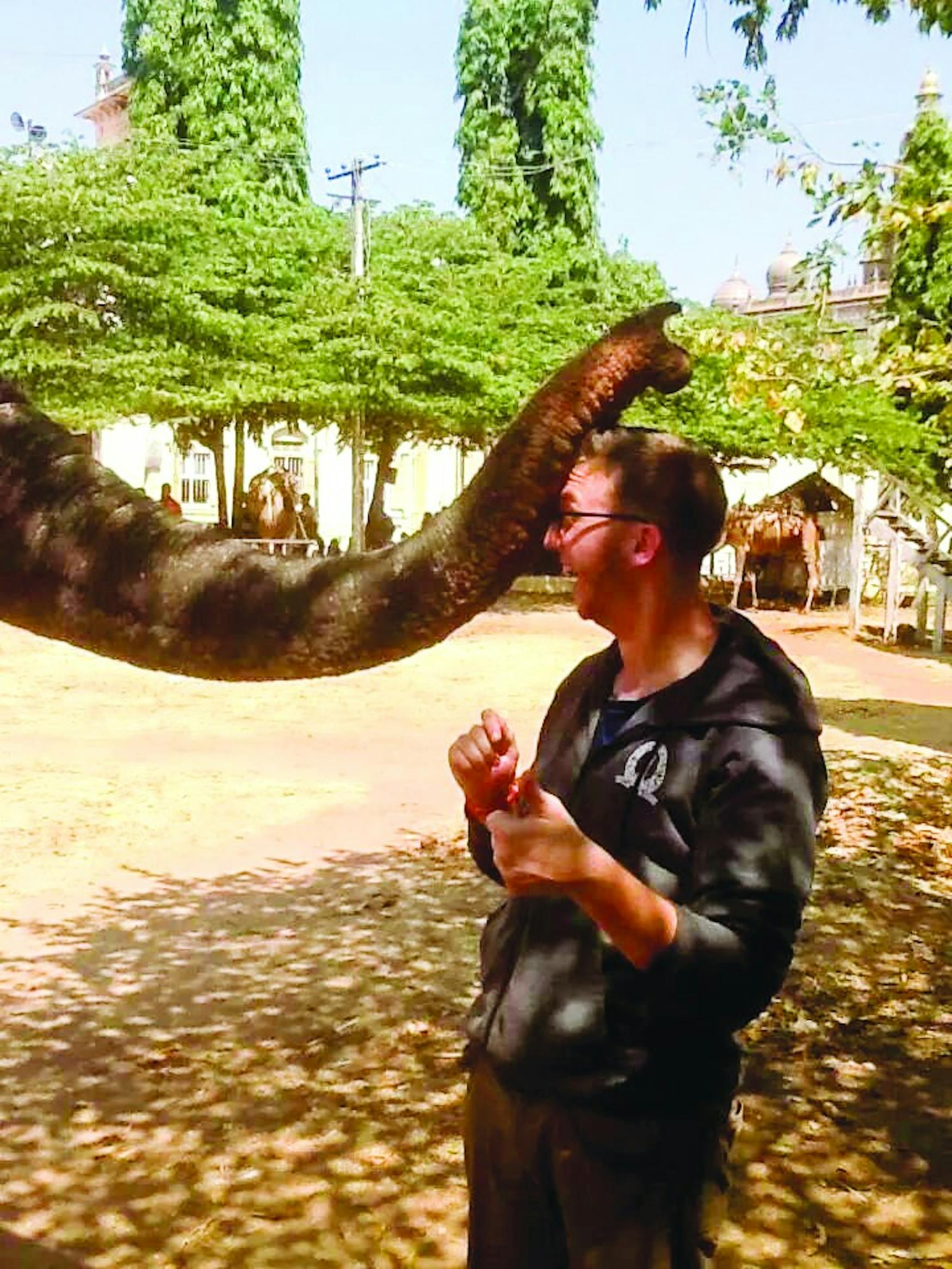Science majors overseas
In February 2013, Jake Cohen ’15 and Alex Cortesi-Gesten ’15 toured a sacred temple outside of Bangalore, India. Overwhelmed by all the experience offered them, they shaved their heads and donned Buddhist monk robes as they bathed in the meditative holy waters of the temple. After being blessed, they listened to yogis speak about the mechanics of time and space and how that seamlessly meshed with the spirituality inherent in all human beings.
As an American student of physics and mathematics, Cohen was awed by India’s deep commitment to both science and spirituality, concepts often viewed as antithetical in the U.S. Imbued with a new sense of wonder for subjects he has been studying all his life, Cohen credits studying abroad in India with redirecting his previously rigid vision for his future research.
Forrest Webler ’15, Cohen and Cortesi-Gesten enrolled in a study abroad program in India that enhanced their studies and allowed them to gain new cultural experience. Through the Brandeis-India Science Scholars Program, students conduct research and take courses at the India Institute of Science in Bangalore while giving Indian students from the institute the opportunity to partake in classes at Brandeis. Although the program was originally launched in 2011, 2013 was the first year that undergraduate students took part in the exchange.
The program was first brought to Webler’s attention by Prof. Bulbul Chakraborty (PHYS), who has a long-standing relationship with the India Institute of Science, a 100-year-old institution which enrolled only graduate students until 2011, when it launched a highly selective, innovative undergraduate program. “The Institute offers hundreds of science and engineering courses every semester that can complement the courses that our undergraduate students can take at Brandeis,” Chakraborty wrote in an email to the Justice.
Webler, having already traveled to India, looked to this program to broaden his understanding of the country. “I had been to India when I was younger and I wanted to gain an authentic experience of the culture in the South while pursuing my physics major,” said Webler. Bangalore, according to Webler, warrants comparison to Silicon Valley due to its high concentration of technology start-ups and young companies.
Webler noted the peculiarity of a place which is at the forefront of scientific research, yet often lacks funding in basic areas. On their first day, in the midst of 108 degree weather, Webler and Cohen were each given only a bucket with which to shower. In addition, clean drinking water was only available at certain times of the day. “In one of our labs, we had a hot water heater—its sole purpose was to heat up water. Yet it wasn’t waterproof. Equipment would often bite back,” Cohen said.
It took time for the Brandeis scholars to become accustomed to the learning environment. From Webler’s perspective, although he was familiar with the content of his research, he noticed that the IISc placed more of a focus on independent study, as opposed to the kind of group dynamic he had gotten used to at Brandeis. “The independent structure of the curriculum took some getting used to, but I found my work rewarding. I completed three classes in total: two theory-based and one lab. I also completed an independent research project on the design and implementation of a Zeeman Slower for ytterbium 171 atoms under the supervision of a professor at the Institute.”
Webler also discovered a higher level of efficiency pursuing independent study. “The teacher provides a general idea of what you should be studying, and then you essentially teach it to yourself. We had to work so hard, there was no point to study in a group. We had no choice but to be entirely self-focused,” Cohen said.
The culture of intellectualism in India struck Cohen as entirely different from the intellectual environment of U.S. universities. Indian education, according to Cohen, teaches a student from a very young age the discipline of rout memorization and respect for the previous generation of researchers.
What stood out the most to Webler wasn’t his courses, but the additional learning tools available to him.“There was more space, more reading, more research opportunities. Just about more of everything,” Webler said.
He also noted that he could take courses of interest at IISc that aren’t offered at Brandeis: “Brandeis doesn’t have an engineering program, but at Bangalore I had the opportunity to explore an engineering program, and that was something that I really enjoyed,” Webler said.
Committed to their coursework, Webler and Cohen took courses five, sometimes six, days a week. For Webler, his experience within the program was beneficial to his pursuit of physics because he was able to approach the subject from a unique perspective, giving him a well-rounded understanding of his research, the importance of which extends beyond himself. “The future of this program is important because India is a country that is developing so quickly in terms of the number of those who choose to pursue an education or a career in the sciences. Understanding differences in the approach to problem solving is essential for international collaboration.”
Cohen’s research experience abroad disoriented his previously well-defined career goals, leaving him with pleasant, if overwhelming, confusion. “I now know less about what I actually want to do but more about the possibilities of what I could do.”



Please note All comments are eligible for publication in The Justice.